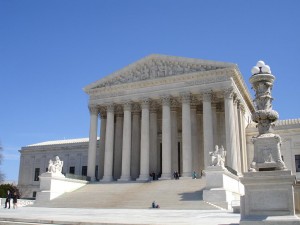Dong v. Holder, US 1st Cir. (10/3/12)
Government & Administrative Law, Immigration Law
 This case required the First Circuit Court of Appeals to decide, for the first time, whether section 1101(a)(42)(B), a statute enacted to pave the way for asylum for victims of China’s coercive population control policies, extends automatically to a spouse of a person forced to undergo an abortion. Petitioner, a Chinese national, petitioned for asylum, seeking to remain in the United States because of, among other things, his wife’s forced abortion. Petitioner argued he was entitled to per se refugee status under 8 U.S.C. 1101(a)(42)(B) “as a person who has been forced to abort a pregnancy.” The immigration judge rejected this argument, and the board of immigration appeals affirmed. The First Circuit Court denied Petitioner’s petition for judicial review after joining several of its sister circuits in holding that, given the language of the relevant statute and the Attorney General’s reasonable interpretation of it, the agency did not err in refusing to grant Petitioner’s per se refugee status on the basis that the Chinese government had compelled his wife to undergo a forced abortion.
This case required the First Circuit Court of Appeals to decide, for the first time, whether section 1101(a)(42)(B), a statute enacted to pave the way for asylum for victims of China’s coercive population control policies, extends automatically to a spouse of a person forced to undergo an abortion. Petitioner, a Chinese national, petitioned for asylum, seeking to remain in the United States because of, among other things, his wife’s forced abortion. Petitioner argued he was entitled to per se refugee status under 8 U.S.C. 1101(a)(42)(B) “as a person who has been forced to abort a pregnancy.” The immigration judge rejected this argument, and the board of immigration appeals affirmed. The First Circuit Court denied Petitioner’s petition for judicial review after joining several of its sister circuits in holding that, given the language of the relevant statute and the Attorney General’s reasonable interpretation of it, the agency did not err in refusing to grant Petitioner’s per se refugee status on the basis that the Chinese government had compelled his wife to undergo a forced abortion.
Read More:
First Circuit: No Automatic Asylum for Chinese Men in Abortion Cases, Wall Street Journal
U.S. v. Tasis , US 6th Cir. (10/4/12)
Government Contracts, Health Law, Public Benefits, White Collar Crime
Tasis and his brother ran a sham medical clinic, recruited homeless Medicare recipients who had tested positive for HIV, hepatitis or asthma, paid the “patients” small sums in exchange for their insurance identification, then billed Medicare for infusion therapies that were never provided. During four months in 2006, the Center billed Medicare $2,855,785 and received $827,000 in return. The scheme lasted 15 months, during which Tasis and his collaborators submitted $9,122,159.35 in Medicare claims. An auditor notified the FBI. After an investigation, prosecutors indicted Tasis on fraud and conspiracy claims. Over Tasis’s objection, co-conspirator Martinez testified that she and Tasis had orchestrated a a similar scam in Florida. The court instructed the jury to consider Martinez’s testimony about the Florida conspiracy only as it related to Tasis’s “intent, plan and knowledge.” The jury found Tasis guilty, and the trial judge sentenced him to 78 months in prison and required him to pay $6,079,445.93 in restitution. The Sixth Circuit affirmed, rejecting various challenges to evidentiary rulings.
 Here is a summary of legal developments in five federal and state court cases last week that involved technology companies, or alleged activities by their users.
Here is a summary of legal developments in five federal and state court cases last week that involved technology companies, or alleged activities by their users.
 This case required the First Circuit Court of Appeals to decide, for the first time, whether section 1101(a)(42)(B), a statute enacted to pave the way for asylum for victims of China’s coercive population control policies, extends automatically to a spouse of a person forced to undergo an abortion. Petitioner, a Chinese national, petitioned for asylum, seeking to remain in the United States because of, among other things, his wife’s forced abortion. Petitioner argued he was entitled to per se refugee status under 8 U.S.C. 1101(a)(42)(B) “as a person who has been forced to abort a pregnancy.” The immigration judge rejected this argument, and the board of immigration appeals affirmed. The First Circuit Court denied Petitioner’s petition for judicial review after joining several of its sister circuits in holding that, given the language of the relevant statute and the Attorney General’s reasonable interpretation of it, the agency did not err in refusing to grant Petitioner’s per se refugee status on the basis that the Chinese government had compelled his wife to undergo a forced abortion.
This case required the First Circuit Court of Appeals to decide, for the first time, whether section 1101(a)(42)(B), a statute enacted to pave the way for asylum for victims of China’s coercive population control policies, extends automatically to a spouse of a person forced to undergo an abortion. Petitioner, a Chinese national, petitioned for asylum, seeking to remain in the United States because of, among other things, his wife’s forced abortion. Petitioner argued he was entitled to per se refugee status under 8 U.S.C. 1101(a)(42)(B) “as a person who has been forced to abort a pregnancy.” The immigration judge rejected this argument, and the board of immigration appeals affirmed. The First Circuit Court denied Petitioner’s petition for judicial review after joining several of its sister circuits in holding that, given the language of the relevant statute and the Attorney General’s reasonable interpretation of it, the agency did not err in refusing to grant Petitioner’s per se refugee status on the basis that the Chinese government had compelled his wife to undergo a forced abortion. In a few days, several of us here at Justia will be traveling to “gorges” Ithaca, New York, to attend the
In a few days, several of us here at Justia will be traveling to “gorges” Ithaca, New York, to attend the  A former Chairman of the the Advisory Board of a professional mutual fund pleaded guilty today in federal court to a series of charges in a $13 million conspiracy to defraud in investors by falsely claiming that Praetorian Global Fund Ltd. privately owned pre-IPO Facebook and Groupon stock before each of the social media start-ups went public. In reality, the British Virgin Islands-based fund did not.
A former Chairman of the the Advisory Board of a professional mutual fund pleaded guilty today in federal court to a series of charges in a $13 million conspiracy to defraud in investors by falsely claiming that Praetorian Global Fund Ltd. privately owned pre-IPO Facebook and Groupon stock before each of the social media start-ups went public. In reality, the British Virgin Islands-based fund did not. The U.S. Supreme Court started its term today, hearing oral arguments for Kiobel v. Royal Dutch Petroleum. The case involves the interpretation of a federal statute enacted by the first Congress as part of the Judiciary Act of 1879—the Alien Tort Statute.
The U.S. Supreme Court started its term today, hearing oral arguments for Kiobel v. Royal Dutch Petroleum. The case involves the interpretation of a federal statute enacted by the first Congress as part of the Judiciary Act of 1879—the Alien Tort Statute. Ameranth, Inc.
Ameranth, Inc.  Defendant, a crematory operator, hid hundreds of uncremated bodies on his property rather than perform cremations he was paid to do. When Plaintiffs, who had received what they thought to be their deceased son’s cremains from Defendant’s crematory, learned about the problems at the crematory, they discovered the body of their son was mishandled and not properly cremated. Plaintiffs sued Defendant for the alleged mishandling of their deceased son’s body. Following a jury verdict for Plaintiffs, the trial court entered judgment against Defendant based on the intentional infliction of emotional distress claim but granted his motion for a judgment notwithstanding the verdict on Plaintiffs’ Tennessee Consumer Protection Act (TCPA) and bailment claims. The court of appeals affirmed. The Supreme Court affirmed, holding that the trial court did not err in (1) holding Defendant liable for intentional infliction of emotional distress in the amount of the jury verdict; (2) instructing the jury that they were permitted to draw a negative inference resulting from Defendant’s invocation of his Fifth Amendment privilege during questioning; and (3) dismissing the TCPA and bailment claims.
Defendant, a crematory operator, hid hundreds of uncremated bodies on his property rather than perform cremations he was paid to do. When Plaintiffs, who had received what they thought to be their deceased son’s cremains from Defendant’s crematory, learned about the problems at the crematory, they discovered the body of their son was mishandled and not properly cremated. Plaintiffs sued Defendant for the alleged mishandling of their deceased son’s body. Following a jury verdict for Plaintiffs, the trial court entered judgment against Defendant based on the intentional infliction of emotional distress claim but granted his motion for a judgment notwithstanding the verdict on Plaintiffs’ Tennessee Consumer Protection Act (TCPA) and bailment claims. The court of appeals affirmed. The Supreme Court affirmed, holding that the trial court did not err in (1) holding Defendant liable for intentional infliction of emotional distress in the amount of the jury verdict; (2) instructing the jury that they were permitted to draw a negative inference resulting from Defendant’s invocation of his Fifth Amendment privilege during questioning; and (3) dismissing the TCPA and bailment claims. Last week, my colleague Ilana Bergstrom and I attended a session called
Last week, my colleague Ilana Bergstrom and I attended a session called  Last Tuesday, The Trademark Trial and Appeal Board (TTAB) upheld a decision to deny Apple’s trademark application to register its music feature mark that’s used on iPhones and other Apple products. The reason? The mark was confusingly similar to another mark that’s now owned by MySpace. Both marks consist of two musical eighth notes on an orange background. MySpace’s mark was originally issued to iLike, a music service that let users download and share music with each other. However, MySpace bought iLike in 2009, and closed it down a few years later.
Last Tuesday, The Trademark Trial and Appeal Board (TTAB) upheld a decision to deny Apple’s trademark application to register its music feature mark that’s used on iPhones and other Apple products. The reason? The mark was confusingly similar to another mark that’s now owned by MySpace. Both marks consist of two musical eighth notes on an orange background. MySpace’s mark was originally issued to iLike, a music service that let users download and share music with each other. However, MySpace bought iLike in 2009, and closed it down a few years later. Petitioner, a death row inmate, appealed the district court’s denial of his petition for writ of habeas corpus brought pursuant to 28 U.S.C. 2254. Petitioner contended that he was denied a fair trial by an impartial judge and unbiased jury because the jury gave the judge and the bailiff inappropriate gag gifts at the conclusion of the trial. Petitioner also contended that there was racial discrimination in the selection of the jury. The court held that it was not unreasonable for the Georgia Supreme Court to find that petitioner did not prove purposeful discrimination by the state in the selection of the jury. The court also held, without condoning the regrettable behavior of either, that both the jury and the judge remained impartial and unbiased throughout the trial. Accordingly, the court affirmed the district court’s denial of habeas relief.
Petitioner, a death row inmate, appealed the district court’s denial of his petition for writ of habeas corpus brought pursuant to 28 U.S.C. 2254. Petitioner contended that he was denied a fair trial by an impartial judge and unbiased jury because the jury gave the judge and the bailiff inappropriate gag gifts at the conclusion of the trial. Petitioner also contended that there was racial discrimination in the selection of the jury. The court held that it was not unreasonable for the Georgia Supreme Court to find that petitioner did not prove purposeful discrimination by the state in the selection of the jury. The court also held, without condoning the regrettable behavior of either, that both the jury and the judge remained impartial and unbiased throughout the trial. Accordingly, the court affirmed the district court’s denial of habeas relief.